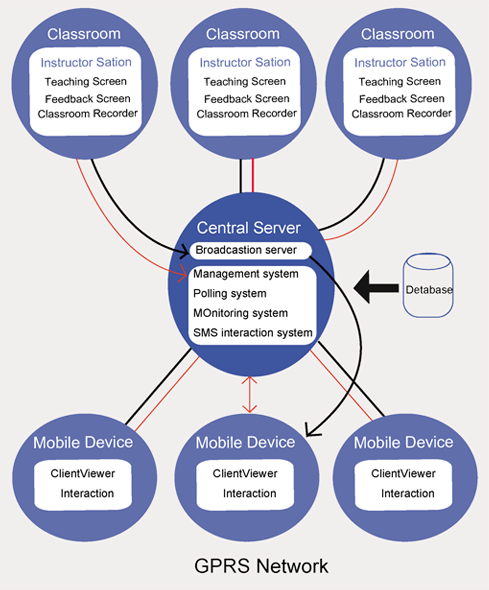 Ruimin Shen
Ruimin Shen
Distinguished Professor
Department of Computer Science & Engineering
Shanghai Jiao Tong University
Team Leader
E-learning Lab
Email:shen-rm@cs.sjtu.edu.cn
Office: SEIEE-3-409
Address: 800 Dong Chuan Road Shanghai 200240, China
Research Interests
Affective Computing, Data Mining, Mobile-learning
Education Background
2009-2013
Doctor of department of Mathematics and Computer Science of FernUniversitat in Hagen
1988-1991
Master of department of Computer Science of Tsinghua University.
1984-1988
Bachelor of department of Computer Science of Tsinghua University
Work Experience
1991-1995 Lecture in the department of computer science and engineering, Shanghai Jiao Tong University
1996-1998 Associate professor in the department of computer science and engineering, Shanghai Jiao Tong University
1997-1998 Visiting Professor in Waseda University
1998- Professor in the department of computer science and engineering, Shanghai Jiao Tong University
2012- Guest Scienst DFKI Germany
2012-2015 Visiting Professor Essex University U.K
Awards
Shanghai Teaching Achievement Award, 2nd class, 2013
Shanghai Teaching Achievement Award, 1st class, 2009
China National Science and Technology Progress Award, 2nd class, 2009
China National Teaching Achievement Award, 2nd Class, 2009
HO LEUNG HO LEE FOUNDATION Award for youth Innovation, 2008
China National Science and Technology Progress Award, 2nd class, 2006
China National Teaching Achievement Award, 1st Class, 2005
Selected Research Topics
 |
Affective computing
Our goal is to enhance the effectiveness of teaching and learning with the evaluation of performance of the subjects. We have built a facial expression database and then labeled the faces into four categories: smooth, normal, confused, and yawn. On the basis of face detection, facial expression analysis of the whole class can be processed.
|
 |
Mobile learning
The Mobile Learning system is a cutting-edge mobile learning system that can deliver live broadcasts of real-time classroom teaching to students with mobile devices. Their system allows students to customize means of content-reception, based on when and where they tune into the broadcast. The system also supports short text-messaging and instant polls. Through these venues, students can ask questions and make suggestions in real time, and the instructor can address them immediately. The evaluation from a formal implementation of the system in a blended English classroom of 1,000 students (with about 800 being online) reveals that Mobile Learning activities can much better engage students in the learning process. Students in this class changed from passive learners to truly engaged learners who are behaviorally, intellectually[ 1, 2], and emotionally involved in their learning tasks.
|
Reference:
1. M Wang, R Shen, D Novak, X Pan. The impact of mobile learning on students' learning behaviours and performance: Report from a large blended classroom, British Journal of Educational Technology 40 (4), 673-695, 2009.(top journal, top articles)
2. Liping Shen, Minjuan Wang & Ruimin Shen, "Affective eLearning: Utilizing Emotion Data to Improve Learning in the Pervasive Environment", Educational Technology & Society, 12 (2), 176¨C189,2009.(best paper)
Project
1. National Natural Science Foundation of China under grant No. 61671290. Affective-Behavioral Collaborative Learner-Teacher Modeling from Multiview Classroom Videos. 2017¡ª2020. (Principal Investigator)
2. Key Program for International S&T Cooperation Project of China under grand No. 2016YFE0129500. Visual-brain Data Fusion Analysis: A Discovery and Evaluation Approach in Israeli and Chinese E-Learning Subjects. 2017¡ª2019. (Principal Investigator)
3. Shanghai Committee of Science and Technology, China under grand No. 17511101903. 2017¡ª2019. (Principal Investigator)
4. National Key Technology R&D Program of China under grant No. 2012BAH55F02. Research of Digital Educational Resource Creation. 2012¡ª2015.
5. ROLE: Responsive Open Learning Environments, Integrated Project, EU Project FP7. 2008¡ª2012.
6. National Science Foundation of China (NSFC) under grant No. 61071154. The Group Sparsity of Boltzmann Machines and its Application in Object Recognition. 2011¡ª2013. (Principal Investigator).
7. Key projects in the national science & technology pillar program during the eleventh five-year plan under grant No. 2007BAH09B05. Interactive Education Application Based on High-performance Broadband Network. 2007¡ª2010. (Principal Investigator).
8. National High-Tech Research Program (863) of China under grant No. 2007AA01Z157. Research on Context-aware Multi-modal Interaction Model and Key Technologies. 2008¡ª2009. (Principal Investigator).
9. National Science Foundation of China (NSFC) under grant No. 60672066. Network Measurement based Overlay Construction Algorithms and its Application. 2007¡ª2009. (Principal Investigator).
10. US Natural Science Foundation (NSF) under grant No. 0623166. Distributed Learning and Collaboration (DLAC) for Next Generation Educational Settings. 2007. (Participant).
11. US Natural Science Foundation (NSF) under Grant No. 0456434. International Collaboration on Web-based Learning: Theory, Research and Practice. 2006. (Participant).
12. National Science Foundation of China (NSFC) under grant No. 60372078. Research On E-Learning Collaborative Learning and Personalized Predictive Model. 2004¡ª2006. (Principal Investigator).
Selected Publications
1. C Ullrich, K Borau, H Luo, X Tan, L Shen, R Shen,Why web 2.0 is good for learning and for research: principles and prototypes,Proceedings of the 17th international conference on World Wide Web, 705-714,2008. (ccf: A; top conference)
2. H Luo, C Niu, R Shen, C Ullrich, A collaborative filtering framework based on both local user similarity and global user similarity, Machine Learning 72 (3), 231-245, 2008.(top journal)
3. Liping Shen, Minjuan Wang & Ruimin Shen, "Affective eLearning: Utilizing Emotion Data to Improve Learning in the Pervasive Environment", Educational Technology & Society, 12 (2), 176¨C189,2009.(best paper)
4. M Wang, R Shen, D Novak, X Pan. The impact of mobile learning on students' learning behaviours and performance: Report from a large blended classroom, British Journal of Educational Technology 40 (4), 673-695, 2009.(top journal, top articles)
5. Shen, R. M., Wang, M. J., Gao, W. P., Novak, D., Tang, L., (2009) Mobile Learning in a large blended computer science classroom: System function, pedagogies, and their impact on learning. IEEE Transactions on Education. 52(4), 538-546.(top journal, top articles)
6. J Wang, C Niu, R Shen, Priority-based target coverage in directional sensor networks using a genetic algorithm, Computers & Mathematics with Applications 57 (11), 1915-1922, 2009.
7. Carsten Ullrich, Ruimin Shen, Ren Tong & Xiaohong Tan: A mobile live video learning system for large-scale learning system design and evaluation. IEEE Transactions on Learning Technologies, 3(1), 2010.(top journal)
8. Heng Luo, Changyong Niu, Ruimin Shen, Carsten Ullrich: Sparse Group Restricted Boltzmann Machines, Proceeding of the 25th AAAI Conference on Artificial Intelligence (AAAI) 2011. San Francisco, California, USA.(ccf: A; top conference)
9. Minjuan Wang & Ruimin Shen, (2012) Message Design for Mobile Learning: Learning Theories, Human Cognition, and Design Principles. British Journal of Education Technology (BJET). 43(4), 561-575.(top journal)
10. Xie, Weikai and Li, Yunfei and Lu, Chenping and Shen, Ruimin, (2012), Optimizing The Resource-updating Period Behavior of HTTP Cache Servers for Better Scalability of Live HTTP Streaming Systems, Proceedings of the The IEEE International Symposium on Broadband Multimedia Systems and Broadcasting (BMSB) 2012.
For more information please go to my Google Scholar page.
Links
E-learning Lab SJTU
CS Dept
[Last
updated: Oct, 2017]
 Ruimin Shen
Ruimin Shen
